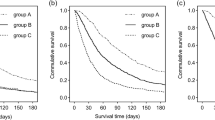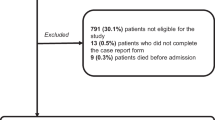Abstract
Purpose
No study has been conducted to compare the clinicians’ prediction of survival (CPS) with Palliative Prognostic Scores (PaP) across countries. We aimed to compare the performance of the CPS in PaP (PaP-CPS), the PaP without the CPS, and the PaP total scores in patients with advanced cancer in three East Asian countries.
Methods
We compared the discriminative accuracy of the three predictive models (the PaP-CPS [the score of the categorical CPS of PaP], the PaP without the CPS [sum of the scores of only the objective variables of PaP], and the PaP total score) in patients admitted to palliative care units (PCUs) in Japan, Korea, and Taiwan. We calculated the area under the receiver operating characteristic curve (AUROC) for 30-day survival to compare the discriminative accuracy of these three models.
Results
We analyzed 2,072 patients from three countries. The AUROC for the PaP total scores was 0.84 in patients in Japan, 0.76 in Korea, and 0.79 in Taiwan. The AUROC of the PaP-CPS was 0.82 in patients in Japan, 0.75 in Korea, and 0.78 in Taiwan. The AUROC of the PaP without the CPS was 0.75 in patients in Japan, 0.66 in Korea, and 0.67 in Taiwan.
Conclusion
The PaP total scores and the PaP-CPS consistently showed similar discriminative accuracy in predicting 30-day survival in patients admitted to PCUs in Japan, Korea, and Taiwan. It may be sufficient for experienced clinicians to use the CPS alone for estimating the short-term survival (less than one month) of patients with far-advanced cancer. The PaP may help to improve prognostic confidence and further reduce subjective variations.

Similar content being viewed by others
Data availability
The data that support the findings of this study are available from the corresponding author, Sang-Yeon Suh, upon reasonable request. All authors agree to provide data to the journal for review if needed.
Code availability
Not applicable.
References
Hui D (2015) Prognostication of survival in patients with advanced cancer: predicting the unpredictable. Cancer Control 22:489–497
Selby D, Chakraborty A, Lilien T et al (2011) Clinician accuracy when estimating survival duration: the role of the patient’s performance status and time based prognostic categories. J Pain Symptom Manage 42:578–588
Amano K, Maeda I, Shimoyama S et al (2015) The accuracy of physicians’ clinical predictions of survival in patients with advanced cancer. J Pain Symptom Manage 50:139–146
Cheon S, Agarwal A, Popovic M et al (2016) The accuracy of clinicians’ predictions of survival in advanced cancer: a review. Ann Palliat Med 5:22–29
Tavares T, Oliveira M, Gonc alves J, et al (2018) Predicting prognosis in patients with advanced cancer: a prospective study. Palliat Med 32:413–416
White N, Reid F, Harris A et al (2016) A systematic review of predictions of survival in palliative care: how accurate are clinicians and who are the experts? PLoS One 11:e0161407
Christakis NA (1999) Prognostication and bioethics. Daedalus 128:197–214
Chow E, Harth T, Hruby G et al (2001) How accurate are physicians’ clinical predictions of survival and the available prognostic tools in estimating survival times in terminally ill cancer patients? A systematic review. Clin Oncol 13:209–218
Maltoni M, Caraceni A, Brunelli C et al (2005) Prognostic factors in advanced cancer patients: evidence based clinical recommendations - a study by the Steering Committee of the European Association for Palliative Care. J Clin Oncol 23:6240–6248
Pirovano M, Maltoni M, Nanni O et al (1999) A new palliative prognostic score: a first step for the staging of terminally ill cancer patients. J Pain Symptom Manage 17:231–239
Glare P, Virik K (2001) Independent prospective validation of the PaP score in terminally ill patients referred to a hospital-based palliative medicine consultation service. J Pain Symptom Manage 22:891–898
Glare PA, Eychmueller S, McMahon P (2004) Diagnostic accuracy of the palliative prognostic score in hospitalized patients with advanced cancer. J Clin Oncol 22:4823–4828
Tassinari D, Montanari L, Maltoni M et al (2008) The palliative prognostic score and survival in patients with advanced solid tumors receiving chemotherapy. Support Care Cancer 16:359–370
Naylor C, Cerqueira L, Costa-Paiva LH et al (2010) Survival of women with cancer in palliative care: use of the palliative prognostic score in a population of Brazilian women. J Pain Symptom Manage 39:69–75
Kurashima AY, Latorre Mdo R, Camargo B (2010) A palliative prognostic score for terminally ill children and adolescents with cancer. Pediatr Blood Cancer 55:1167–1171
Tarumi Y, Watanabe SM, Lau F et al (2011) Evaluation of the Palliative Prognostic Score (PaP) and routinely collected clinical data in prognostication of survival for patients referred to a palliative care consultation service in an acute care hospital. J Pain Symptom Manage 42:419–431
Numico G, Occelli M, Russi EG et al (2011) Survival prediction and frequency of anticancer treatment in cancer patients hospitalized due to acute conditions. Role of clinical parameters and PaP score. Support Care Cancer 19:1823–1830
Baba M, Maeda I, Morita T et al (2015) Survival prediction for advanced cancer patients in the real world: a comparison of the palliative prognostic score, delirium-palliative prognostic score, palliative prognostic index and modified prognosis in palliative care study predictor model. Eur J Cancer 51:1618–1629
Suh SY, Choi YS, Shim JY et al (2010) Construction of a new, objective prognostic score for terminally ill cancer patients: a multicenter study. Support Care Cancer 18:151–157
Hui D, Park M, Liu D et al (2016) Clinician prediction of survival versus the Palliative Prognostic Score: which approach is more accurate? Eur J Cancer 64:89–95
Yoon SJ, Suh SY, Hui D et al (2021) Accuracy of the palliative prognostic score with or without clinicians’ prediction of survival in patients with far advanced cancer. J Pain Symptom Manage 61:1180–1187
Farinholt P, Park M, Guo Y et al (2018) A comparison of the accuracy of clinician prediction of survival versus the palliative prognostic index. J Pain Symptom Manage 55:792–797
Hui D, Ross J, Park M et al (2020) Predicting survival in patients with advanced cancer in the last weeks of life: how accurate are prognostic models compared to clinicians’ estimates? Palliat Med 34:126–133
Christakis NA, Lamont EB (2000) Extent and determinants of error in doctors’ prognoses in terminally ill patients: prospective cohort study. BMJ 320:469–472
Yoon SJ, Jung JG, Kim JS et al (2014) Comparison of accuracy among prognostic scores for predicting life expectancy in Korean patients with cancer with weeks of survival. Am J Hosp Palliat Care 31:845–852
White N, Reid F, Vickerstaff V et al (2020) Specialist palliative medicine physicians and nurses accuracy at predicting imminent death (within 72 hours): a short report. BMJ Support Palliat Care 10:209–212
Hui D, Ross J, Park M et al (2019) Predicting survival in patients with advanced cancer in the last weeks of life: how accurate are prognostic models compared to clinicians’ estimates? Palliat Med 34:126–133
Nakazawa Y, Yamamoto R, Kato M et al (2018) Improved knowledge of and difficulties in palliative care among physicians during 2008 and 2015 in Japan: association with a nationwide palliative care education program. Cancer 124:626–635
Yamamoto R, Kizawa Y, Nakazawa Y et al (2015) Outcome evaluation of the Palliative care Emphasis program on symptom management and Assessment for Continuous Medical Education: nationwide physician education project for primary palliative care in Japan. J Palliat Med 18:45–49
Yamaguchi T, Maeda I, Hatano Y et al (2021) Communication and behavior of palliative care physicians of cancer patients near end-of-life in three East Asian countries. J Pain Symptom Manage 61:315–322
Bedford O, Yeh KH (2019) The history and the future of the psychology of filial piety: Chinese norms to contextualized personality construct. Front Psychol 10:100
Acknowledgements
We are grateful to Harrisco Encorrection (Seoul, South Korea) for proofreading this manuscript for grammar and clarity.
Funding
This work was supported in part by a Grant-in-Aid from the Japanese Hospice Palliative Care Foundation; Grant Numbers 16H05212 and 16KT0007.
Author information
Authors and Affiliations
Contributions
Yusuke Hiratsuka: Conceptualization, data curation, investigation, methodology, project administration, writing—original draft, writing—review and editing
Seok-Joon Yoon: Conceptualization, formal analysis, investigation, methodology, project administration, writing—original draft, writing—review and editing
Sang-Yeon Suh: Conceptualization, investigation, methodology, project implementation, supervision, writing—review and editing
Sung Eun Choi: Formal analysis, writing—review and editing
David Hui: Supervision, writing—review and editing
Sun-Hyun Kim: Investigation, writing—review and editing
Eon Sook Lee: Investigation, writing—review and editing
Sun Wook Hwang: Investigation, writing—review and editing
Shao-Yi Cheng: Investigation, writing—review and editing
Ping-Jen Chen: Investigation, writing—review and editing
Masanori Mori: Conceptualization, investigation, methodology, project administration, resources, supervision, writing—review and editing
Takashi Yamaguchi: Investigation, writing—review and editing
Tatsuya Morita: Funding acquisition, investigation, writing—review and editing
Satoru Tsuneto: Supervision, writing—review and editing
Akira Inoue: Investigation, supervision, writing—review and editing
Corresponding author
Ethics declarations
Ethics approval
This study obtained was approved by the local Institutional Review Boards of all participating institutions. The independent ethics committee of Tohoku University School of Medicine (approval no. 2016-1-689) approved this study.
Consent to participate
In accordance with the ethical guidelines for human research of the Ministry of Health, Labor, and Welfare in Japan, patients’ informed consent was waived in Japan because of the completely observational nature of the study. Patients were provided the opportunity to opt out. In South Korea and Taiwan, informed consent was obtained from the patients or their families (in case the patient lacked the capacity to decide).
Consent for publication
The authors affirm that human research participants provided informed consent for publication of the article.
Conflict of interest
The authors declare no competing interests.
Additional information
Publisher's note
Springer Nature remains neutral with regard to jurisdictional claims in published maps and institutional affiliations.
Rights and permissions
About this article
Cite this article
Hiratsuka, Y., Yoon, SJ., Suh, SY. et al. Comparison of the accuracy of clinicians’ prediction of survival and Palliative Prognostic Score: an East Asian cross-cultural study. Support Care Cancer 30, 2367–2374 (2022). https://doi.org/10.1007/s00520-021-06673-0
Received:
Accepted:
Published:
Issue Date:
DOI: https://doi.org/10.1007/s00520-021-06673-0




